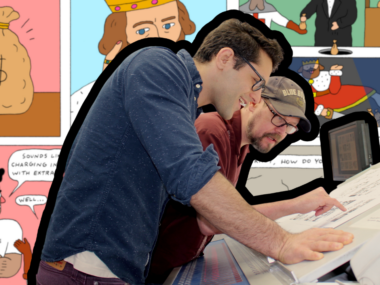Written by Jaelyn Molyneux, BA’05
It could start with subtle personality changes or irritability. Usually, it takes the onset of psychosis before it is diagnosed. People who have it are often seen as violent, but they are more likely to be the victims of violence. How much do you know about schizophrenia? Likely not much. It’s a disorder that is often misunderstood and stigmatized.
That knowledge gap is part of what motivated Dr. Anees Bahji, MD, to collaborate with TED-Ed to develop a five-and-a-half-minute video explaining the illness. The animated short describes the complex disorder and breaks down what is known and what is still unknown. It’s enough information to answer the fundamental questions of the curious viewer. For those who want more, the video is the precursor to a lesson plan and resources to dig deeper. “What is schizophrenia?” has been viewed more than nine million times and has more than 11,000 comments on YouTube.
TED is known for its highly polished and engaging talks given by experts sharing their bold ideas. TED-Ed is its youth and education initiative. It’s a platform for teachers and students to encourage learning. It does that, in part, with short video collaborations with experts known as TED-Ed Originals.
Its ambition is to reach the masses. It’s the opposite of what Bahji does in his research and clinical work. He’s currently a post-doctorate student in the Department of Community Health Sciences at the Cumming School of Medicine. His work in psychiatry includes addiction treatment and epidemiology. “It’s about zooming in,” he says. “I’ll work with one person, and we have to work on the micro.” While he considers working a tremendous privilege, sometimes he needs to create balance by zooming out. That’s what TED-Ed does by taking something very personal and making it a little more universally known.
Bahji became involved when he saw a call for creators from TED-Ed. While there were already several original videos focused on mental health, Bahji noticed a gap in information about schizophrenia for TED-Ed and an overall lack of information about psychosis on YouTube.
Creating the video was a nearly two-year process during which Bahji worked with a team of directors, producers, animators, project managers, fact-checkers and more. The process was collaborative and rigorous. Among the priorities was ensuring the information was accurate, and the tone was correct.
“The videos try to strike a balance between being educational, entertaining and appealing to a wide range of audiences,” says Bahji. “Some of the scientific articles I write are jargony, and I love that too, but that doesn’t work for the mainstream. You don’t have to be a scientist to understand these videos. Most people can look at an animation and understand what stigma is.”
Since his first video about schizophrenia, Bahji has created TED-Ed Original videos about marijuana, steroids and eating disorders. Each answers common questions about the complex topic and helps millions of people learn a little more.
“Scientists believe the universe is made up of knowable units. In a small way, these videos are helping people gain some units of knowing,” says Bahji. “It’s very satisfying for me because I also feel that. I’m curious and trying to understand the world.”
Bahji’s collaborative videos on TED-Ed and the accompanying resources and lesson plans can be found below and on the TED-Ed YouTube channel.



